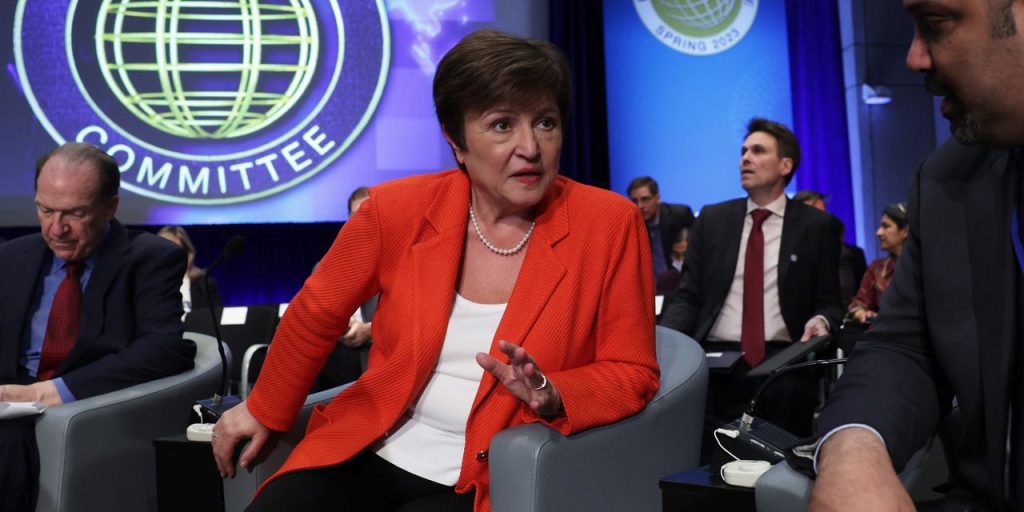The global economy’s glass doesn’t look that full to Kristalina Georgieva, the managing director of the International Monetary Fund. She said on Thursday that the global economy is “not in a great place” even if it can avoid a recession or hard landing.
The view from Georgieva and the IMF’s economists at the annual spring meetings of the IMF and the World Bank contrast with how Treasury Secretary Janet Yellen sees the situation. Yellen said this week that observers shouldn’t “overdo the negativism,” calling the outlook “reasonably bright,” given that expectations for inflation are easing and the financial system has held up in the wake of the latest trouble in banking.
The IMF expects the global economy to grow 2.8% this year, if stresses on the financial system are contained. More troubling is that it foresees growth of 3% next year, but doesn’t see much acceleration from there. Its medium-term growth forecast for five years out also at 3%––the lowest in decades.
As debt levels rise, consumers are able to buy less with their dollars, while uncertainty and the chances of trouble are rising, according to Georgieva.
“2.8% global growth isn’t enough to bring opportunities to businesses and people around the world and most worrisome is the projection for weak growth over a longer period,” Georgieva said at a press briefing. “In my book, we aren’t in a great place.”
The IMF sees risks rising, including the potential for more financial stress, given that more-persistent inflation could require tighter monetary policy to rein it in. Looking at the whole banking sector, including smaller banks, IMF officials have spotted evidence that lending is contracting—a phenomenon that could threaten the already meager growth they expect from the global economy.
“The key is monitoring the risks hiding in the shadows of the banks and nonbank financial institutions or sectors like commercial real estate,” Georgieva said. “At this time in the economy, vigilance is absolutely paramount.”
Decoupling of economies—or what the IMF calls fragmentation—also poses a risk as countries seek ways to make their supply chains more secure in response to disruptions resulting from Covid-19 and the war in Ukraine, especially as that effort takes a “higher priority seat” in economic discussions, Georgieva says. Russia’s invasion of Ukraine has forced companies and countries to think more about geopolitical, not just economic risks.
“The question is: Can we be more determined to enhance security of supplies but not push the world that far that we are into a second Cold War,” says Georgieva. “If we fail to be more rational then people everywhere will be worse off. The middle-class in rich countries would pay a price as well so a bit more coolheadedness in that process would take us a long way.”
The IMF estimates fragmentation of trade could cost the global economy between 0.2% to 7% of economic activity over the long term. The total could be as much as 12% if technology companies are forced to pick sides.
In a separate panel discussion at the meetings, Raghuram Rajan, finance professor at the University of Chicago Booth School of Business and former governor of the Reserve Bank of India, echoed the risk of widespread fragmentation. One source of concern: The dearth of dialogue between the U.S. and China and the possibility that national security becomes a front for all sorts of protectionism, which would lead to a much more volatile world, he said.
Georgieva also highlighted the growing divergence between the haves and have-nots, with a record 345 million people facing acute food insecurity, mostly in low-income countries. Some of these countries, such as Zambia, Sri Lanka, and Ghana, have been buckling under debt and are seeking relief. That poses a major test of how China, a major creditor to these low-income countries, will deal with needed debt restructurings—and whether financial contagion in frontier markets. could be avoided.
On that front, Georgieva reported some progress. The Global Sovereign Debt Roundtable met on Wednesday, bringing to the table public and private-sector creditors—including China—along with the indebted countries to try to find consensus on the need to work more on the timeline for countries to get debt relief and find ways to make the debt restructuring process more efficient.
Write to Reshma Kapadia at reshma.kapadia@barrons.com
Read the full article here




